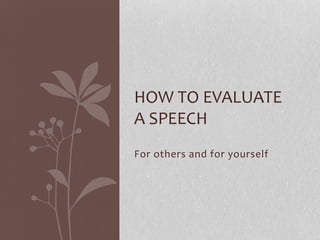
Evaluate a speech.pptx
- 1. For others and for yourself HOW TO EVALUATE A SPEECH
- 2. 1. Effective speech evaluations benefit everyone • You (as the evaluator) improve as a speaker by providing an evaluation. A great way to solidify your own knowledge is to teach it to others. • The speaker becomes aware of both their strengths and areas with potential for improvement. • The audience for the evaluation (if there is one, as in Toastmasters) benefits from hearing the evaluation and applying the lessons to their own presentations. • Future audiences benefit from improved speakers.
- 4. 2. Learn the objectives of the speaker. • Before the speech takes place, ask the speaker what their objectives are. Sometimes the objective is obvious, but not always. • Perhaps the speaker has just read the “Presentation Zen Book” and is experimenting with a modern style of visuals which goes against common practice. • If you know this, you can tailor your evaluation accordingly. • If you don’t, you may unfairly criticize them for not considering the expectations of the audience.
- 5. 3. Consider the skill level of the speaker… • Evaluating the (very) inexperienced speaker: • Treat novice speakers with extra care. Be a little more encouraging and a little less critical, particularly if they exhibit a high level of speaking fear. Compliment them on tackling their fear. Reassure them that they aren’t as bad as they imagine. Be supportive. Ask them how they feel it went. • Evaluating the (very) experienced speaker: • A common misconception is that you cannot evaluate a speaker if they are more experienced than you. This is false. Though you may have limited speaking experience, you have a lifetime of experience listening to presentations. Every speaker, no matter how experienced, can improve. Perhaps more importantly, every speaker wants to improve. You can help.
- 6. 4. Take advantage of available tools. • Study other evaluators and apply their techniques. • Solicit feedback from others on your technique. • Develop evaluation templates or forms that work for you. • If available, utilize audio or video recording to complement your evaluation. As an example: • Without video, you can only tell when a gesture could have been used. • With a video recording, you can show exactly where a timely gesture could be used.
- 7. 5. Be truthful. • If you did not like the speech, do not say that you did. If you did not like a component of the speech, do not say you did. • There is a tendency to want to be nice and embellish the positives. Dishonest praise will only damage your credibility and character.
- 8. 6. Express your opinion. • Avoid speaking on behalf of the audience with phrases like “Everyone thought…” or “The audience felt…” You can only accurately talk about are your own thoughts and feelings. • On the other hand, suppose you observe a spectator crying as a result of an emotional speech. In this case, you can remark on this as evidence that the speech had emotional impact. • Magical phrases in a speech evaluation start with personal language: “I thought… I liked… I felt… I wish…”
- 9. 7. Avoid absolute statements.
- 10. 8. Be specific. Use examples. Explain why. • How can you make sure that the constructive criticism doesn’t completely outweigh the praise and end up discouraging the speaker? • The answer: be specific. In addition to being specific and tying comments to examples from the speech, it also helps to explain why you liked or didn’t like a particular aspect of the speech. Consider the effectiveness of the following four statements: • “Gestures were poor.“ • “Gestures were limited in the first half of the speech.“ • “Gestures were limited in the first half of the speech because the speaker gripped the lectern.“ • “Gestures could have been improved in the first half of the speech. By removing her hands from the lectern, she could more easily make natural gestures.“
- 11. 9. Don’t evaluate the person or their objective. • Evaluate how well the message is delivered, not the messenger. Keep your comments focused on the presentation • Similarly, avoid evaluating the speaker’s objective. For example, suppose the speaker’s objective is to convince the audience that recycling is a waste of time. If you always reduce, reuse, and recycle, don’t let that influence your evaluation. (By all means, start a debate about it later, write an article, give your own speech, etc.) As an evaluator, your primary role is to help the speaker achieve their objective in the most convincing way possible
- 12. 10. Evaluate whether the objective was achieved. • Everything other than the speaker themself and their primary objective is fair game for your evaluation: content, speech structure, humor, visuals, eye contact, gestures, intangibles, etc. and everything else covered in the first article from this series 11. The best evaluations are a combination of praise, areas for improvement, and specific suggestions. All three elements are essential, but can be mixed in numerous ways.